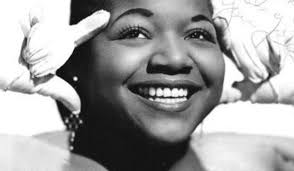Big Maybelle, born Mabel Louise Smith on May 1, 1924, in Jackson, Tennessee, is celebrated as one of the most powerful and soulful voices in blues and R&B history. With her commanding presence and emotionally charged performances, Big Maybelle left an indelible mark on the music world. Her story is one of talent, resilience, and an enduring passion for her craft.
Early Life and Musical Beginnings
Mabel Louise Smith grew up immersed in the rich musical traditions of the South. As a child, she sang in church, where her powerful voice first garnered attention. By her teenage years, she was performing in local talent shows and exploring secular music, inspired by the burgeoning blues and jazz scenes.
In the early 1940s, Mabel’s journey into professional music began when she joined the International Sweethearts of Rhythm, one of the first integrated all-female big bands. This experience helped her develop her skills as a performer and exposed her to the rigors of touring. By the mid-1940s, she was performing with the Christine Chatman Orchestra and later worked alongside prominent bandleaders like Count Basie and Tiny Bradshaw.
Rise to Fame
Adopting the stage name “Big Maybelle,” a nod to her larger-than-life personality and vocal style, she began recording in the late 1940s. Her breakthrough came in 1952 with Okeh Records, where she recorded “Gabbin’ Blues,” a track that showcased her ability to blend humor and heartbreak. The song became a hit, reaching the top of the R&B charts and establishing her as a rising star.
Big Maybelle’s career continued to flourish throughout the 1950s. She signed with Savoy Records and recorded some of her most iconic songs, including “Candy,” her 1956 rendition of the classic ballad, which earned her a Grammy Hall of Fame induction. Her raw emotion and unique phrasing set her apart from her contemporaries, and her music resonated deeply with audiences.
Musical Style and Influence
Big Maybelle’s music blended blues, jazz, and gospel, creating a sound that was both timeless and deeply personal. Her powerful, husky voice could convey a wide range of emotions, from fiery defiance to heartrending vulnerability. She was known for her dynamic stage presence, captivating audiences with every performance.
Her influence extended beyond the blues genre. Artists like Aretha Franklin, Etta James, and Janis Joplin drew inspiration from her soulful delivery and emotional depth. Big Maybelle’s ability to cross musical boundaries helped pave the way for future generations of female vocalists.
Challenges and Legacy
Despite her immense talent, Big Maybelle faced significant challenges in her career. The music industry of the time was not always kind to African American artists, and she struggled with health issues, including diabetes and addiction, which impacted her career in later years. However, her resilience and dedication to her craft remained unwavering.
Big Maybelle passed away on January 23, 1972, at the age of 47. Though her life was tragically short, her impact on music was profound. Today, she is remembered as a trailblazer who broke barriers and brought unparalleled passion to the blues.
Remembering Big Maybelle
Big Maybelle’s contributions to music continue to be celebrated by fans and musicians alike. Her recordings remain a testament to her talent and serve as a reminder of the enduring power of the blues. Songs like “Candy,” “Whole Lotta Shakin’ Goin’ On,” and “Rain Down Rain” stand as timeless classics that showcase her extraordinary voice and emotional depth.
Through her music, Big Maybelle continues to inspire and captivate listeners, securing her place as one of the true legends of blues and R&B.


No responses yet